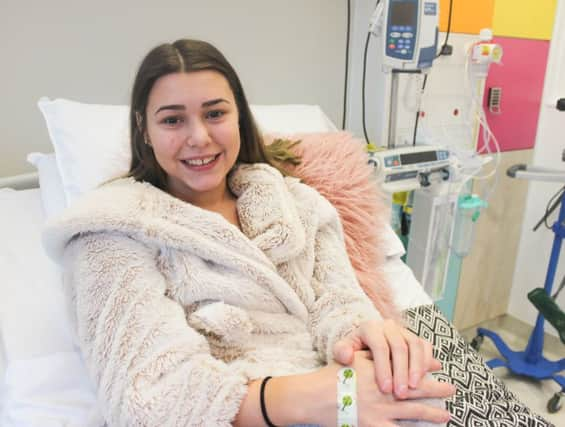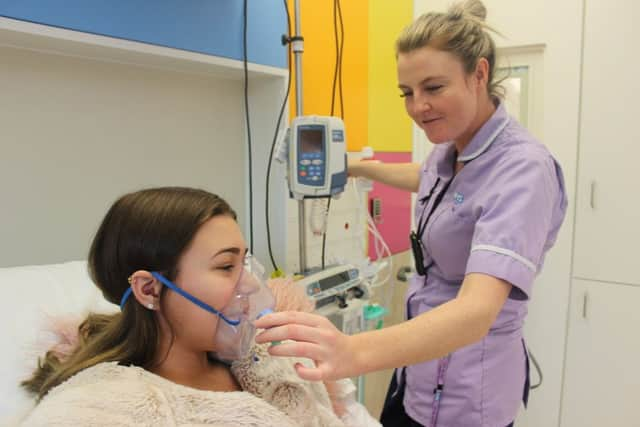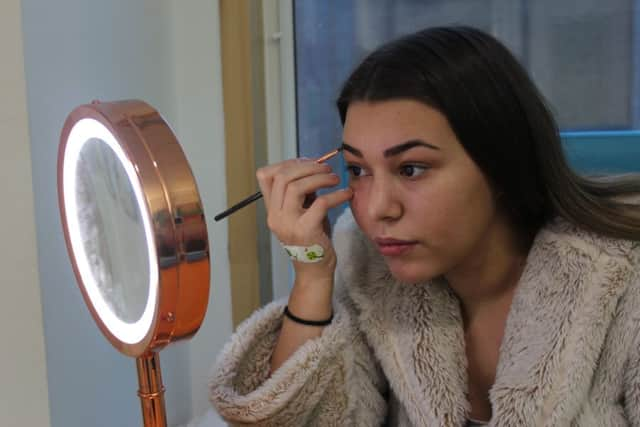Teenager’s pledge to become make-up artist despite Cystic Fibrosis


Lucy Mountain, 17, is not letting long hospital stays stop her from pursuing a career she loves.
Lucy has cystic fibrosis (CF) and has been a regular at Sheffield Children’s Hospital for two weeks at a time, every ten weeks, for intensive treatment since she was born. She has now just transferred to the adult unit, and she know she will miss the staff at the Children’s Hospital who have become more like family
Advertisement
Hide AdAdvertisement
Hide Ad“Coming to Sheffield Children’s is like a second home for me. I have been coming here for as long as I can remember,” says Lucy from Rotherham. At the hospital she juggles her hours of treatment with attending college to study hair and media make-up. She plans to become a professional make-up artist and the nurses love having their beauty guru on the ward.


Cystic fibrosis (CF) is an inherited disorder that causes a build-up of thick mucus in the lungs and the digestive system. This can cause breathing problems and increases the risk of lung infections, whilst also clogging the pancreas making digestion difficult.
Lucy also has diabetes as well as her CF, so her trips to hospital are important for her to keep on top of both conditions, receive IV antibiotics and oxygen when needed, and be closely monitored by specialist staff.
“I can bring my own pillow, blanket, laptop and everything I need for college and get help with my physiotherapy and other treatment for my CF and diabetes.
Advertisement
Hide AdAdvertisement
Hide Ad“It’s really important for me to come here because it keeps me on track to look after myself. It’s difficult to keep up with the amount of physio, nebulisers and other care for CF, so the support from the hospital keeps me going.”


Lucy was born with a condition which meant part of her bowel had to be removed at just eight hours old. Later tests confirmed she had Cystic Fibrosis.
As a result Lucy often struggles for breath and is prone to infections which can land her in hospital. It also means lots of drugs and twice daily physiotherapy, a regmne she admits she has struggled with as she has got older.
“In 2017 I was feeling really well and having a great time with my friends over the summer and I just didn’t want to be bothered with all the treatment. But by the October I became really unwell and had to spend two months in hospital and nearly ended up in ICU. It made me realise thatin order to stay well I had to stick with the treatment regime. Now I feel better than ever. I love college, have a boyfriend and and have a great cicrle of friends.”
Advertisement
Hide AdAdvertisement
Hide AdNoreen West, Consultant CF Paediatrician at Sheffield Children’s said: “Lucy is proof that you can have a lifelong condition and still study, follow your career aspirations and enjoy life to the full.
“Cystic fibrosis is a complex and time consuming condition. For many children with CF this can mean 1-2 hours a day to perform chest physiotherapy and take multiple nebulised drugs as well taking over 50 tablets a day for someone of Lucy’s age. Despite this they will often require prolonged admissions to hospital requiring two weeks on intravenous antibiotics for lung infections and assistance to clear their airways, as well as maximising their nutrition.
“Both the Sheffield Children’s CF team and I feel privileged to look after children like Lucy from diagnosis soon after birth until they successfully move onto adult care. Having an environment which feels welcoming and comfortable, working with a great team who respect and know them well, helps to make children and young adults cope with a rigorous and intrusive regime.”
Holly-Rae Smith, Youth Empowerment Officer at the Cystic Fibrosis Trust, said: “It’s fantastic that Lucy is able to follow her passion with the support of her Cystic Fibrosis team at Sheffield Children’s. Being a teenager is difficult for everyone but deciding what you want to do while managing a condition like cystic fibrosis can be particularly hard. At the Trust we run regular courses on topics like applying to university or starting work. These can help young people with the disease to develop their skills and help them achieve their goals.”